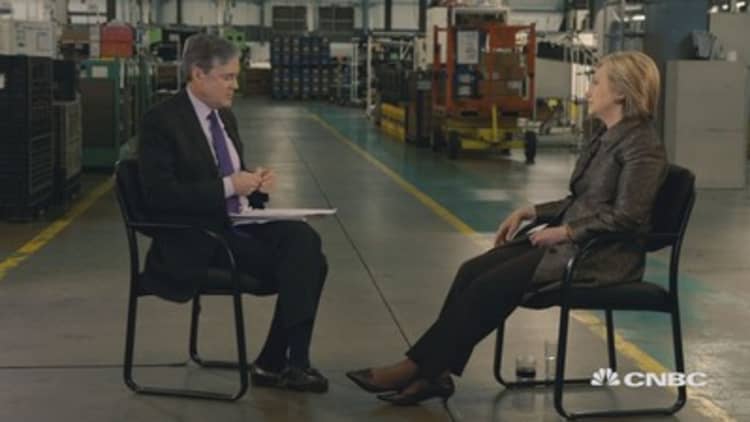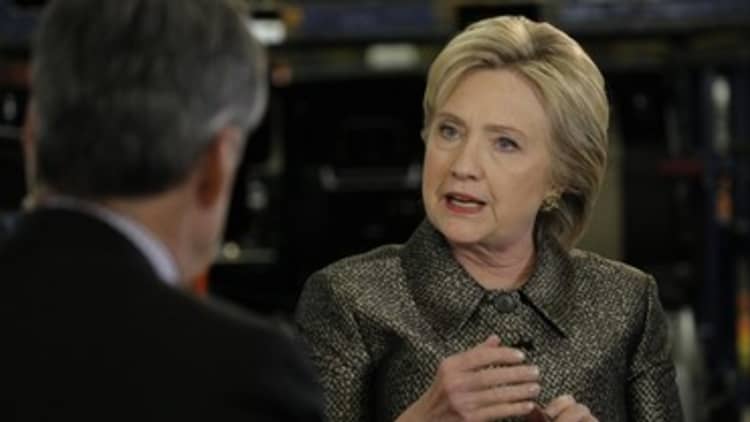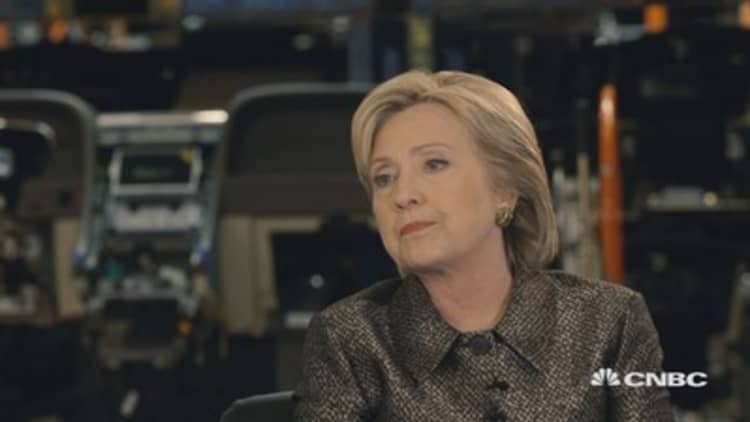



DETROIT — Hillary Clinton aims to thread the needle.
Facing a populist challenge from Bernie Sanders, she wants Democratic primary voters to know she'll crack down on business practices that harm workers and taxpayers. But she also wants business executives to know she's not simply out to get them.
She wants voters to see the difference between her sensible, achievable economic policy promises and Sanders' costly, extravagant ones. But she wants a struggling middle-class to know she intends to deliver real change.
And she wants Americans to know she stands against what she calls "snake-oil" economics and personal invectives offered by Republican presidential candidates. But she also insists her aim is to unify and "make America whole."
That balancing act became clear in an interview here at the automobile dashboard manufacturing plant of Detroit Manufacturing Systems. We sat down after she unveiled a proposal to "claw back" tax benefits companies had received if they subsequently shift jobs overseas.
Days after her campaign released an advertisement vowing a strong response to predatory pricing by pharmaceutical manufacturers, I asked if she intended to signal she'd be bad for business.
"I don't think what I'm arguing is bad for business at all," Clinton said. "It certainly is focused on bad behavior of some businesses.
"When you see a company like Nabisco, which has taken a lot of government benefits and now is picking up and moving a production line out of our country, when you look at and Johnson Controls, which came hat and hand to Washington to be bailed out along with the rest of the auto industry, and now wants to take advantage of an inversion and pretend to buy a company and move their headquarters in order to avoid paying American taxes when the American taxpayers bailed them out, that's bad behavior, John.
"That is the kind of behavior that we do have to go after because we're in a company right here that has great productivity, has a great reputation, invests in their workers, the biggest woman-owned company in Michigan and it's a place that I want more companies to look at and be part of," Clinton continued, referring to Detroit Manufacturing Systems. "It has unionized labor. They work together. So I have a very strong commitment to doing what I can to encourage behavior that is for the long term and that invests in Americans and gets the middle class growing again."
Clinton cited a recent Tax Policy Center analysis concluding that Sanders' economic agenda would raise taxes by $4,700 annually for families in the middle 20 percent of income-earners. But she bristled at the idea that her own plans — which mostly spare the bottom 95 percent of taxpayers — don't go far enough in areas like infrastructure to create jobs and boost economic growth.
I want to propose things I can get done. I don't want to make promises I can't keep.Hillary Clinton
"I've gone as far as I think the political — you know, equation, will sustain," she said. "It has to be both. I want to propose things I can get done. I don't want to make promises I can't keep.
"Look, I was in favor of a much bigger stimulus package. I was in favor with quantitative easing of, you know, figuring out how to make some investments in infrastructure.
"What I'm proposing is on top of what the Congress finally got around to passing," she added. "Look how long it took them to pass the highway bill. I also want to put in place a national infrastructure bank so we don't have to keep going back to the Congress. So I think what I have proposed is both doable and realistic."
Clinton ridiculed the Republican reliance on "trickle-down" economics, insisting that "they don't have an agenda for the middle class, working people, poor people trying to get ahead." And she lamented the level of dialogue in a Republican nomination contest revolving around Donald Trump.
"The rhetoric they've been using, the insults they engage in, the bigotry and bullying that we see is, I think, distressing to a lot of voters," she said. "I really regret some of the ways that the Republican candidates — and not just Trump, but the others — have been so divisive, finger-pointing and blaming people, going after people's fundamental rights, their civil rights and women's rights and gay rights and workers rights."
Even so, Clinton insisted that if she wins the nomination she can move past the rancor. Carrying the scars of her quarter-century in the national spotlight that began with her husband's presidency, she insisted she will stick to his trademark political formula of making the campaign about the voters.
"You've got to run a campaign that is about people's lives," she said. "I don't expect to win them all, but I'm going to reach out to everybody, talking about what I will do as president, how what I will do will help Americans of every kind."
Her first step is winning the Democratic nomination. And at least for now she appears to be on track for that after her big wins on Super Tuesday last week.
The next big contest is Tuesday's Michigan primary. In an NBC News/Wall Street Journal/Marist poll released Sunday, Clinton led Sanders by 57 percent to 40 percent.




